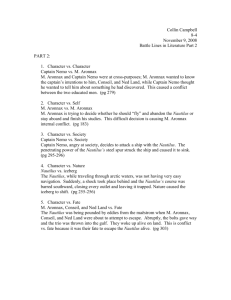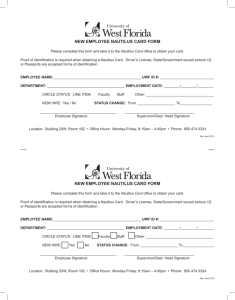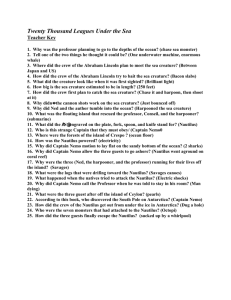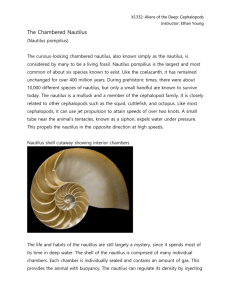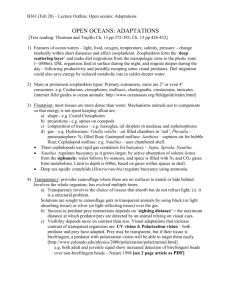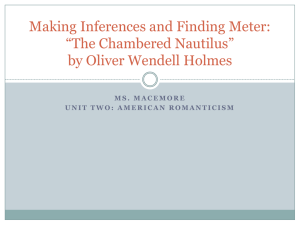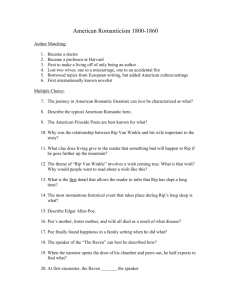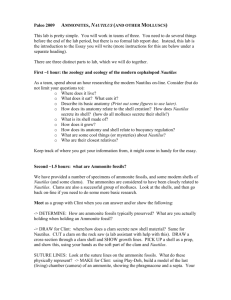Andy Miller Found Poem
advertisement
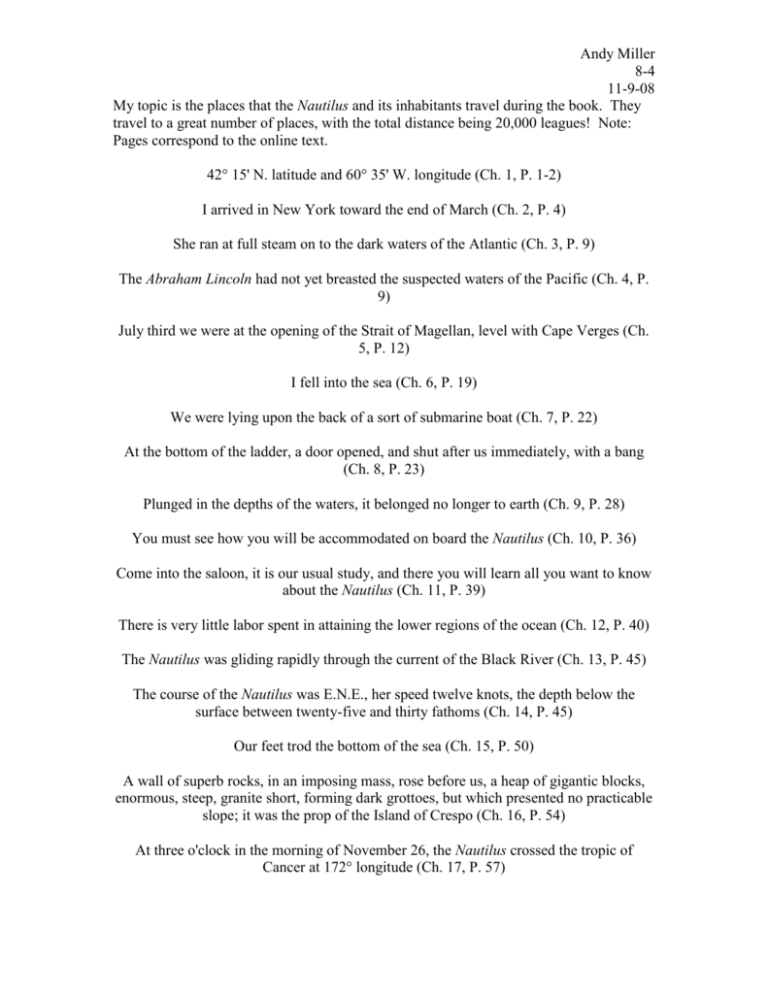
Andy Miller 8-4 11-9-08 My topic is the places that the Nautilus and its inhabitants travel during the book. They travel to a great number of places, with the total distance being 20,000 leagues! Note: Pages correspond to the online text. 42° 15' N. latitude and 60° 35' W. longitude (Ch. 1, P. 1-2) I arrived in New York toward the end of March (Ch. 2, P. 4) She ran at full steam on to the dark waters of the Atlantic (Ch. 3, P. 9) The Abraham Lincoln had not yet breasted the suspected waters of the Pacific (Ch. 4, P. 9) July third we were at the opening of the Strait of Magellan, level with Cape Verges (Ch. 5, P. 12) I fell into the sea (Ch. 6, P. 19) We were lying upon the back of a sort of submarine boat (Ch. 7, P. 22) At the bottom of the ladder, a door opened, and shut after us immediately, with a bang (Ch. 8, P. 23) Plunged in the depths of the waters, it belonged no longer to earth (Ch. 9, P. 28) You must see how you will be accommodated on board the Nautilus (Ch. 10, P. 36) Come into the saloon, it is our usual study, and there you will learn all you want to know about the Nautilus (Ch. 11, P. 39) There is very little labor spent in attaining the lower regions of the ocean (Ch. 12, P. 40) The Nautilus was gliding rapidly through the current of the Black River (Ch. 13, P. 45) The course of the Nautilus was E.N.E., her speed twelve knots, the depth below the surface between twenty-five and thirty fathoms (Ch. 14, P. 45) Our feet trod the bottom of the sea (Ch. 15, P. 50) A wall of superb rocks, in an imposing mass, rose before us, a heap of gigantic blocks, enormous, steep, granite short, forming dark grottoes, but which presented no practicable slope; it was the prop of the Island of Crespo (Ch. 16, P. 54) At three o'clock in the morning of November 26, the Nautilus crossed the tropic of Cancer at 172° longitude (Ch. 17, P. 57) Andy Miller 8-4 11-9-08 We were close to Vanikoro, really the one to which Dumont d'Urville gave, the name of Isle de la Recherche, and exactly facing the little harbor of Vanou, situated in 16° 4' south latitude, and 164° 32' east longitude (Ch. 18, P. 60) Captain Nemo informed me that his intention was to get into the Indian Ocean by the Strait of Torres. (Ch. 19, P. 63) I was much impressed on touching land (Ch. 20, P. 66) "Tomorrow," added the captain, rising, "tomorrow, at twenty minutes to three P.M., the Nautilus shall float, and leave the Strait of Torres uninjured." (Ch. 21, P. 75) The Nautilus floated in the midst of a phosphorescent bed, which, in this obscurity, became quite dazzling (Ch. 22, P. 78) This glade was a cemetery, this hole a tomb, this oblong object the body of the man who had died in the night (Ch. 23, P. 84) We were furrowing the waters of the Indian Ocean, a vast liquid plain (Ch. 1, P. 85) I knew that we were nearing the Island of Ceylon, the pearl which hangs from the lobe of the Indian Peninsula (Ch. 2, P. 88) The boat neared Manaar Island, which was rounded to the south (Ch. 3, P. 92) We were in the waters of the Red Sea (Ch. 4, P. 98) In less than twenty minutes, the Nautilus, carried along by the torrent, had passed through the Isthmus of Suez (Ch. 5, P. 106) Upon taking the course of the Nautilus I found that we were going toward Candia, the ancient Isle Crete (Ch. 6, P. 109) For one instant I caught a glimpse of the beautiful ruins of the temple of Hercules, buried in the ground, according to Pliny, and with the low island which supports it; and a few minutes later we were floating on the Atlantic (Ch. 7, P. 115) "Well, M. Aronnax," replied Captain Nemo, "we are in that Vigo Bay; and it rests with yourself whether you will penetrate its mysteries." (Ch. 8, P. 119) Atlantis, the ancient Meropis of Theopompus, the Atlantis of Plato, that continent denied by Origen, Jamblichus, D'Anville, Malte-Brun, and Humboldt, who placed its disappearance among the legendary tales admitted by Posidonius, Pliny, Ammianus Marcellinus, Tertullian, Engel, Buffon, and D'Avezac (Ch. 9, P. 124) Andy Miller 8-4 11-9-08 In the very heart of an extinct volcano, the interior of which has been invaded by the sea, after some great convulsion of the earth (Ch. 10, P. 126) All the day of February 22 we passed in the Sargasso Sea, where such fish as are partial to marine plants and fuci find abundant nourishment (Ch. 11, P. 129) He did nothing of the kind, but continued on his way to the southern regions. Where was he going to? to the pole? It was madness! (Ch. 12, P. 131) The sun appearing for an instant at noon, Captain Nemo took an observation as near as possible which gave our situation at 51° 30' longitude and 67° 39' of south latitude (Ch. 13, P. 137) The South Pole! (Ch. 14, P. 145) We were in open sea; but at a distance of about ten yards, on either side of the Nautilus, rose a dazzling wall of ice (Ch. 15, P. 147) Thus, around the Nautilus, above and below, was an impenetrable wall of ice. We were prisoners to the iceberg (Ch. 16, P. 149) The Nautilus went at a rapid pace. The polar circle was soon passed, and the course shaped for Cape Horn (Ch. 17, P. 155) For several days the Nautilus kept off from the American coast. Evidently it did not wish to risk the tides of the Gulf of Mexico, or of the sea of the Antilles (Ch. 18, 158) The tempest burst on May 18, just as the Nautilus was floating off Long Island, some miles from the port of New York. I can describe this strife of the elements! for, instead of fleeing to the depths of the sea, Captain Nemo, by an unaccountable caprice, would brave it at the surface (Ch. 19, P. 166) It was on May 17, about 500 miles from Heart's Content, at a depth of more than 1,400 fathoms, that I saw the electric cable lying on the bottom (Ch. 20, P. 167) I looked in the direction of the vessel I had already seen. It was nearing the Nautilus, and we could see that it was putting on steam. It was within six miles of us (Ch. 21, P. 169) The maelstrom! Could a more dreadful word in a more dreadful situation have sounded in our ears! We were then upon the dangerous coast of Norway. Was the Nautilus being drawn into this gulf at the moment our boat was going to leave its sides? We knew that at the. tide the pent-up waters between the islands of Ferroe and Loffod (Ch. 22, P. 174) Thus ends the voyage under the seas (Ch. 22, P. 174)
